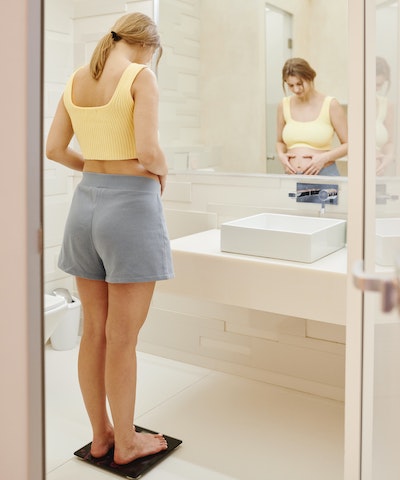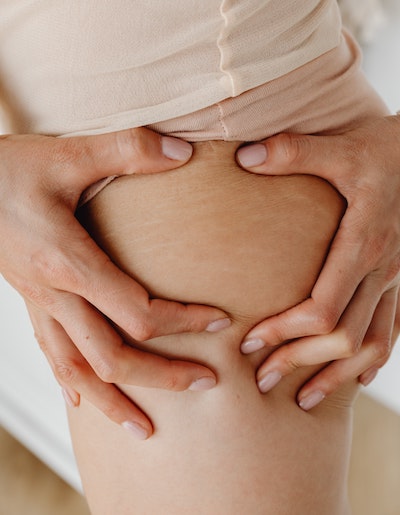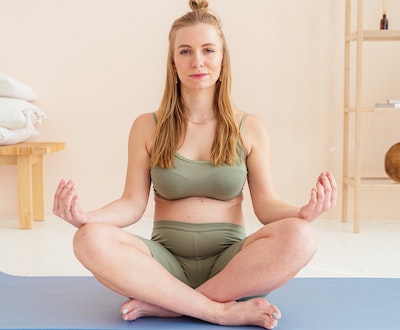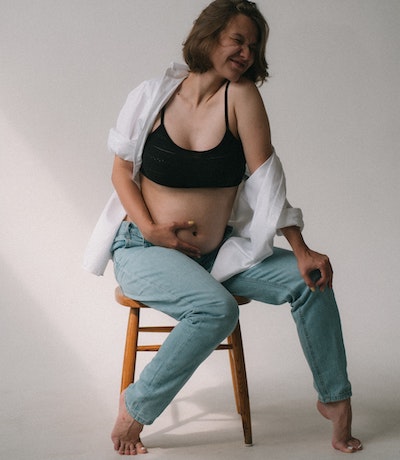Are you struggling with acceptance of the “new you” after giving birth? Your whole life has just changed, so it’s normal that you feel overwhelmed! And all those post-baby body changes that no one told you about before… Remember that you’re not alone mama!
In this article I’m discussing how the body changes after giving birth and how to become friends with your “new mama’s body”.

This article is not a substitute for medical advice.
While making a baby sounds like a job that is assigned to the uterus, the fact is that your entire body works together for 9 months to create a tiny version of you and your partner – a perfect little human who carries your DNA.
The organs work hard, the hormones get to work, and the body modifies itself to prepare for birth and breastfeeding. The heart beats faster to pump more blood to the growing fetus, and the liver and lungs give up space for the expanding uterus. The rib cage and hips widen, the breasts enlarge, and the skin stretches as your body gains weight. Even the brain decreases in size.
That’s a lot of change!
And many new moms, consider delivery and giving birth the finish line.
The prize: an adorable 8 pound newborn and your tired body. After all, it is the end of the journey.
But it is not.
Most women are taken by surprise when they notice body changes in their postpartum period – changes like hair loss or weight gain.
Here is what happens to your body after you have given birth.
Post Baby Body Changes
In the days and weeks following delivery, the body goes through a series of changes yet again. For many women, some of these postpartum body changes are temporary and go away in a few months, while for others they are more permanent.
But knowing what to expect from your postpartum journey is important because it sets realistic expectations. Studies show1 that while women are more likely to accept changes during pregnancy because of the baby, they have a difficult time with postpartum changes.
This is why it is important to know what to expect and have realistic goals:
Weight Gain After Giving Birth
It’s obvious that during pregnancy you gain weight and it may take a year or even longer to loose it. Many women lose around 10-13 pounds right after giving birth. This includes the weight of the baby, along with the placenta and amniotic fluid.

While breastfeeding is a great way to reduce weight, burning up to 500 calories per day, many women face difficulty losing weight. This is due to a lack of sleep, a poor diet, stress, and thyroid issues.
Extra weight gain during pregnancy and a lack of exercise and healthy foods during the postpartum period can result in additional pounds after giving birth.
What’s more, women who have had c-sections may not be able to do strenuous exercise for a few months after their surgery.
Hair Loss
Thanks to high hormone levels of estrogen, your hair seems luscious and thick in the last trimester. But after giving birth, estrogen levels drop and new moms experience hair loss, which lasts around 6 – 8 months.
Skin: Varicose Veins, Stretch Marks, Linea Nigra
While hormones like estrogen and progesterone give your face the pregnancy glow, increased blood flow, high blood volume and improper vessel functioning cause varicose veins. Some new moms can also get varicose veins from breastfeeding.
However, varicose veins are quite common, affecting up to 35% of people in the US2, and in most cases, they go away several weeks after delivery.
Many women also get stretch marks on their chests, stomachs, thighs, bums, and backs. These are caused by rapid weight gain and loss. They are permanent, although they may fade and lighten over time with the use of best belly oils that are safe pre- and post-pregnancy, as well as creams and lotions.

Another common change on pregnant women bellies is the linea nigra – dark line that goes down the abdomen. In general, throughout pregnancy, you may notice that your skin in specific areas (like nipples) becomes darker.
That happens due to hormonal changes. Pigmentation changes are also very common, but usually those dark areas fade after the the birth. However, some women that experienced melasma during pregnancy may keep dark patches for many years.
Vaginal Changes After Giving Birth
A vaginal birth often leads to hemorrhoids, a sore perineum, and constipation. As estrogen drops, women should also expect vaginal dryness and a low sexual drive.
Around 1 in 3 women also end up with weakened pelvic floor muscles that lead to incontinence. Although Cesarean section doesn’t fully protect from urinary incontinence, it is more common after vaginal delivery3.
These problems may have a huge impact on mom’s self-esteem and general well-being. I have three kids, so I FEEL YOU MAMA!
Increased Breast Size & Sagging Breasts
Hormones also lead to an increase in breast size during pregnancy. After birth, the breasts swell as the milk supply comes in. Some women even experience milk leakage and engorgement.
While breastfeeding is great for burning calories, reduces the risk of breast cancer, and has multiple benefits for you and your baby, it also leads to sagging and asymmetric breasts.
Yet another thing that in many cases lowers new mama self-esteem and self-confidence.
Uterus
In the first few weeks after birth, the hormone oxytocin causes the uterus to contract and shrink. Initially, the contractions feel a lot like cramps and will be accompanied by bleeding. It takes the uterus around 6 weeks to 8 weeks to return to its original size.
Weakened Ab Muscles
Another change that you may notice is that your stomach muscles are more weak after the pregnancy and labor. They are strained a lot and may even split.
Once you get through postpartum, you may consult your health provider (or even better – a specialist in obstetrics and gynecology) how to strengthen your weak abdominal muscles to prevent further stain.

Hormonal & Emotional Changes In Pregnant Women
Pregnancy causes many changes in the mother’s brain. Research studies have found evidence that pregnancy causes a reduction in the gray matter volume that focuses on social cognition4. This helps to explain what is usually referred to as the ‘mom brain.’
Similarly, hormone levels in your body also fluctuate, and many women experience feelings of dysphoria5, mood swings and baby blues. It’s also very common for postpartum mamas to feel overwhelmed. Women with high risk factors like stress and lack of social support also tend to suffer from postpartum depression (PPD).
If you’re experiencing any symptoms of PPD, please seek for medical help!
How To Accept Your Body
Motherhood is confusing. Some days it can feel beautiful and blissful, and on others, it can be demanding and overwhelming. On the hardest days, it feels like even your body has betrayed you and is not yours anymore.
It doesn’t feel the way it used to.
It certainly doesn’t look the way it did.
Heck, at times, it doesn’t even work as it should.
Your engorged breasts ache and leak, and you have less bladder control. Most women suffer from swollen feet, and nothing in the wardrobe seems to fit the way it used to.
Add unrealistic cultural and social expectations about body shape, which result in negative body issues for many new moms. Postpartum bleeding, menstrual cramps, and sleepless nights make it all even worse.
Postpartum is not easy. And here’s something most pregnant women are never told: You don’t just give birth to a new baby, you also give birth to a whole new you! Here’s how you can accept and love her.

Being Kind To The New Mom
We are kind to new moms, right?
We visit with gifts, compliment their post pregnancy body, gush over their new baby, and offer all kinds of encouragement and support.
And while we are kind to them, we are often cruel to this new person that we become after birth.
When we look in the mirror, we only see our flabby stomach and saggy boobs. We become our own greatest critics and start comparing ourselves to women in glossy magazines. We scrutinize our stretch marks and varicose veins and demand from ourselves lose weight instantly.
This is why the first step is to be kind to yourselves and your new bodies. Don’t expect yourself to look and feel great all the time. It took you nine months to gain those extra pounds (and create a new life being). Demanding from yourself to lose all of it in just a few weeks after birth is just WAY TOO HIGH expectation.
Your hormones are everywhere, so it is okay to feel all sorts of emotions. Express yourself and cry if it makes you feel better. Don’t be afraid to ask friends and family for help, and at the end of the day, tell yourself that you did great today!
Celebrate The Wins- Big & Small Ones
Celebrate your milestones and how far you have come in your journey. Be proud of what you have achieved and who you have become. You should wear your scars proudly, you don’t have to hide them away.
You just gave birth, of course you would look like it.
Focus On Strength, Not Size
Once your doctor has allowed you to exercise, start with a regime that focuses on your health and strength, not just size.
Instead of jumping into an intensive weight loss regime or going on a fad diet, work on health goals like stamina and strength. Getting your old body back isn’t impossible, but make sure you focus on getting stronger in the process.
- Switch to a healthy diet including iron rich foods
- Ensure you take postnatal supplements that focus on iron and calcium deficiency.
- Limit your salt and sugar intake.
- Make sure you keep yourself hydrated.
- Add kegel exercises to strengthen your pelvic muscles.
- For some women, postpartum becomes a turning point toward a healthier lifestyle with more nutritious meals, better stamina, and strength training.
- Most importantly, before you start your workouts and diet make sure to consult your doctor!
Love Yourself
It’s easy to lose yourself in motherhood when you have a growing baby, but remember, you can’t pour from an empty cup. Make sure you take time for yourself to enjoy a meal out with friends, go for a run, or get a haircut. Take care of your body and your mental health by going for a walk or just doing what YOU LOVE.
Ask your partner to put the baby to bed while you take a nice, warm bath and lather yourself in lotion. Feed your soul with a relaxing massage. Nourish your tired body with hydrating creams. Skincare is of great importance during and even after pregnancy, so make sure you use body lotions that pregnancy (and breastfeeding) safe.
Ingredients like retinol should be avoided during pregnancy and nursing. Instead, use body oils that promote skin cell rejuvenation and keep your skin nourished and moisturized. They also help reduce stretch marks and itching by improving the elasticity of the skin.
Step Up Your Postpartum Style Game
Many moms hate the fact that they have to still wear maternity jeans after the baby has arrived. Feel good about your body and yourself by opting for styles that flatter your new body shape.
Get nice, supportive bra so you look and feel great. You may also get yourself a pretty nursing-friendly nightgown with lacy details that will make you feel sexy and good about yourself.
Play with cuts, colors, and patterns. Dark colors and tunics may be your new best friends.
Want something foolproof? Go for high-waisted black leggings with flowy tunics. These aren’t just fun, they’re also functional if you’re breastfeeding.
When To See A Coctor
Eat healthy food, get enough rest, and listen to your body. Don’t skip any postnatal appointments, and be sure to read up on the signs of postpartum depression, postpartum bleeding, and infections. Get in touch with your doctor if you experience:
- Pain or discomfort in your c-section scar or abdomen,
- Excessive bleeding
- Vaginal discharge
- An engorged breast that hurts
- Lump in your breast
- PPD symptoms
- High fever
- UTI symptoms
Always talk to your doctor and ask any questions you may have about your mental and physical health.
Here are two questions that many new moms ask after they have had their first child:
Does Your Body Shape Change After Having A Baby?
Your body shape changes after having a baby, because it has to make space for the baby. Some of these changes, like wider hips and diastasis recti are more prominent and may be influenced by your genetic structure.
Every woman’s body is different. Some women return to their pre-pregnancy body shape in a few months or a year while others have difficulty getting back to their old body shape at all. Diet, lifestyle and genetics have a huge role to play in this.
Regular exercise, a healthy diet, and workouts that target specific areas are great places to start. For example, exercises that focus on strengthening your core muscles and stomach muscles can also help you eliminate your flabby stomach as well as help with saggy breasts.
However, some changes like an increase in shoe size may be more permanent.
How Long Does Your Body Take To Go Back To Normal After A Baby?
The body returns to ‘normal’ within 6-8 weeks after birth. Normal hair growth patterns return, varicose veins and stretch marks lighten and most women find themselves with the same level of energy they had before. However, women who opt to breastfeed find their bodies continue to change till the weaning process.
And like I mentioned above, some changes, like extra weight, acne, back pain or weakened pelvic area – may take much longer time to go back to “normal”.
The purpose of this article is informative. It’s not a substitute for professional medical advice or medical care. Remember: safety first! Consult your doctor/pediatrician in case of any doubts. The author of this article does not accept any responsibility for any liability, loss or risk, personal or otherwise, incurred as a consequence, directly or indirectly, from any information or advice contained here.

